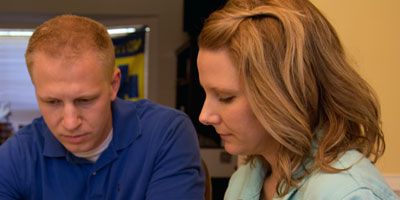
 Infertility is a heart-breaking experience for couples who want to have a child.
Infertility is a heart-breaking experience for couples who want to have a child.
Those who have tried unsuccessfully for years describe it as a loss, just like a death in the family, which they have to grieve and come to terms with.
Trying to have a baby also engenders a lot of soul searching for Catholics, who have to weigh the pursuit of life against the moral ambiguity of certain methods.
One couple was frustrated by the fact that the Church is very clear on what cannot be done to achieve conception, but less clear on what they can do.
Artificial insemination, surrogacy, and in vitro fertilization are clearly ruled as immoral by the Congregation for Doctrine of the Faith in “Donum Vitae.”
However, the instruction did not rule out all methods of technology to overcome infertility, and many theologians believe it has been left up to the individual to make a moral judgment of their own when it comes to certain techniques, such as lower tubal ovum transfer and gamete intrafallopian transfer.
The Catechism of the Catholic Church 2377 instructs couples that they must not dissociate the sexual act from the procreative act. Because the two transfer methods combine the loving marital act with laboratory assistance, theologians hotly debate whether the practice merely assists the couple or bypasses them entirely.
Luckily, there are options with no moral ambiguity.
The Pope Paul VI Institute based in Omaha offers NaPro — natural procreative technology — that identifies problems couples are having and makes corrections. Sometimes this can be a quick, easy fix for irregular cycles or cysts, but sometimes it’s more complicated and requires surgery, such as for endometriosis.
Whatever the outcome, couples who use the process call it a well kept secret and wish more people knew about it.
Institute statistics show that NaPro is three times more effective than in vitro.
Christine and Vince Sullivan, who attend St. Mary in Greenville, said it took about five years of charting and addressing various issues before they conceived. Their daughter, Clare Marie, just turned 1.
“You have to pray. You have to have patience,” Mrs. Sullivan said. “It’s not a quick answer, but to me it’s the only answer. Because it’s not just the medical side of it, it’s the spiritual side of it. It’s just changed my life so much.”
She said the intimacy of the process brought them closer to each other and God.
Nancy McGrath, a registered nurse and fertility educator, said NaPro was created by Dr. Thomas Hilgers as a way to use the Creighton model to identify biological markers that indicate trouble with conception.
McGrath cautions couples not to write off Creighton as “old school,” noting that advances in technology have made it more effective than artificial methods.
“It’s getting at that underlying medical condition that’s making the reproductive system ill,” McGrath said.
Along with the Pope Paul institute, Dr. Hilgers has also founded the National Center for Women’s Health, Fertility-Care Center of Omaha, and the Center for NaPro Ethics.
“I happen to think most of what is being done with women’s reproductive health care today is very bad medicine, and we’ve developed a whole climate of health-care professionals who could care less about what’s wrong with the woman,” he told Legatus magazine. “If she has irregular cycles or cysts, they put her on the [birth-control] pill. Then, if it’s infertility, they don’t look at the causes. They jump over and rush to IVF.”
Couples who have used NaPro said it benefits women’s health on an overall basis, not just infertility.
When Jean and Jason Beaudoin spoke to doctors about having a child, the immediate recommendation was in vitro, Mrs. Beaudoin said. Since that wasn’t an option, they contacted the institute and started charting with Creighton, which led to the discovery of endometriosis throughout her body.
She said it took years to address her health issues. In that time, conception remained out of reach, but her marital bond was strengthened and they drew closer to God as a couple.
“Infertility is such a great cross to carry,” she said, adding that it’s sad and difficult, and creates so many moral dilemmas. But sometimes, couples have to accept that God has other plans for them.
The Beaudoins pursued NaPro fertility and adoption, and are still open to life, she said, but have also accepted God’s will.
“All you can see for a little while is the pain, but God brings you out of that. He really does,” she said. “You just have to accept His will and go on with your life.”
For a fertility care consultant in your area, call Kelli Ball at (803) 807-0158 or email kellihball@yahoo.com.
Read more about Catholics like you by subscribing to The Catholic Miscellany
